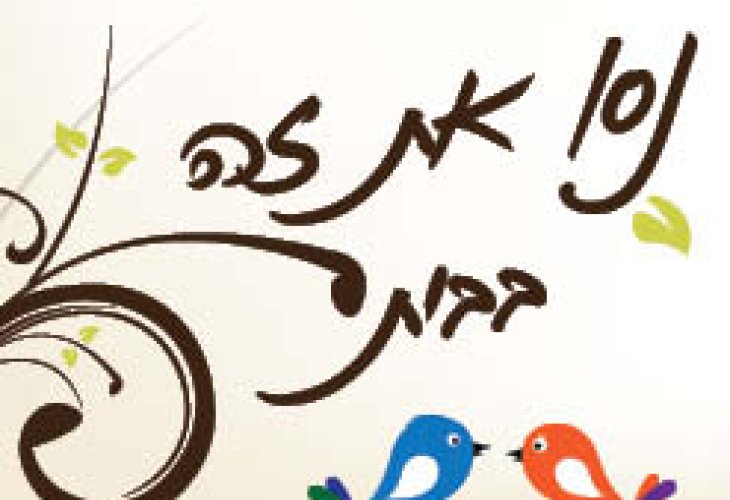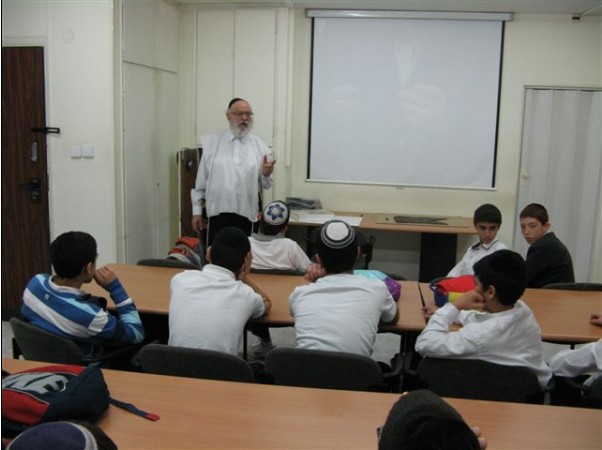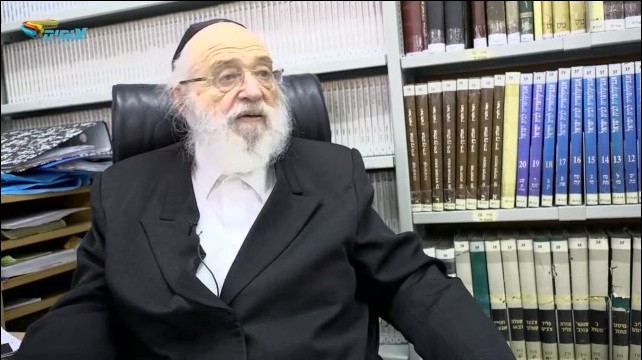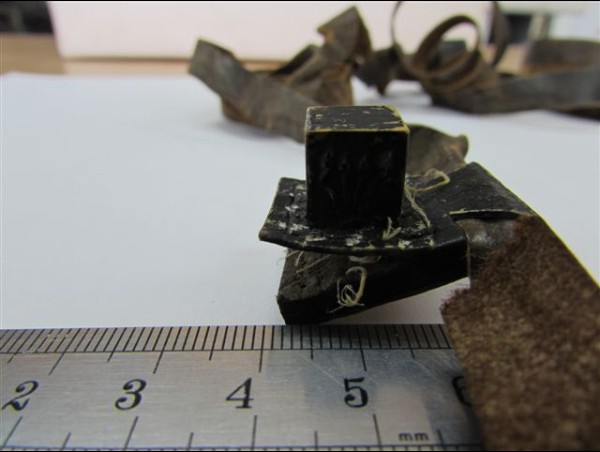Rabbi David Skolsky: "Use Tisha B'Av to Hear About the Holocaust - Not the Atrocities"
Rabbi Skolsky, director of the Kiddush Hashem Archive, suggests using Tisha B'Av to listen and read about the Holocaust. He doesn't recommend reading about the horrors and abuse, but rather stories of holiness and Jewish heroism.

"The connection between Tisha B'Av and the Holocaust is well known and famous," says Rabbi David Skolsky, director of the Kiddush Hashem Archive, in a conversation we have with him on the eve of Tisha B'Av. "One can see how great rabbinic leaders have composed elegies about the Holocaust and added them to the elegies of Tisha B'Av. For instance, Rabbi Shmuel Wosner, may his memory be a blessing, composed such elegies, as did the Rebbe of Bobov, and many great rabbis composed elegies about the Holocaust. There are also many synagogues that customarily recite them. Moreover, the author and founder of the Kiddush Hashem Archive, R. Moshe Prager, compiled a booklet called the 'Holocaust Scroll.' He did not add it to the Tisha B'Av elegies, but it was printed along with the Mishnah studied in memory of the Holocaust martyrs and is commonly studied on Tisha B'Av.
"For the connection between Tisha B'Av and the Holocaust is direct. Indeed, we do not have the power to compare one catastrophe to another or one Holocaust to another, but we cannot ignore that the Holocaust in Europe destroyed all the strongholds of Torah and murdered six million of our people. The great divine assistance we had during that period was that a remnant remained on Mount Zion."
A Day When Hearts Open
As the director of the Kiddush Hashem Archive, Rabbi Skolsky says that Tisha B'Av is a day when he sees anew each year just how many people among the Jewish people open up and want to hear firsthand testimonies about the Holocaust.
"We receive endless phone calls from people who want to come and visit and also listen to the stories and testimonies. This is why we backed up our phone line 'Gnizach-Phone,' through which such testimonies can be heard via a phone call. People are definitely interested; it is very moving to see how on Tisha B'Av hearts open. I think it's also related to the fact that on Tisha B'Av one doesn't study Torah, so naturally, even people who are busy with study throughout the year and aren't free to hear stories and testimonies see it as their privilege and duty on such a day to sit and listen. This is the reason that on Tisha B'Av our telephone system almost collapses because our phone line has so many remarkable firsthand testimonies. We interviewed nearly 2,000 Holocaust survivors, and since in our community many people have no ability to watch videos, we make it accessible via a phone line".
And do you recommend listening and hearing? What about people who feel they are too sensitive and it's not suitable for them to hear such testimonies?
"I completely think it is an absolute obligation for everyone to listen and hear and know what happened to their nation," asserts Rabbi Skolsky. "The point is that one needs to know what to hear and how to convey it. We, at the Kiddush Hashem Archive, do not see, for example, any point in presenting the wickedness of the nations, but rather only Jewish heroism of Israel. We do not describe how the Nazis beat and burned and abused like wild beasts. Though we have such materials in abundance, because when we interview people, these also naturally come up, but we do not market it to the public. We do not want to give the impression that the Jewish people supposedly marched like sheep to the slaughter, but instead, all we want is to tell about the amazing Jewish heroism there was in the Holocaust. Every time I hear the stories, I get excited anew. Because unbelievable stories get to us, about acts of heroism that are unimaginable".
This explanation, as Rabbi Skolsky notes, also reassures survivors who sometimes fear opening up this painful chapter in their lives and speaking. "I explain to them that our sole purpose is to document the story so that future generations will know how a Jew observed commandments, and this is definitely one of the things that get them to interview. Not just one or two have told me this. There are also those who stipulate to me the condition: 'As long as we are alive, do not dare to show the video to my children and grandchildren.' To this day, thank God, I have kept this promise with respect."

Jewish Heroism
One of the topics Rabbi Skolsky says comes up again and again in survivors' testimonies is observing the Shabbat during the Holocaust, at all costs.
"A dear Jew told me that during his time in a concentration camp, the Nazis forced him and his friends to lay rail tracks in the middle of a mountain, tracks that were supposed to be used for train movement. There were two types of work - one was digging in the mountains and removing rocks, and the other was moving the rocks to the valley to create a plain between the mountains. Digging in the mountains was relatively easier than dragging the rocks, which was truly horse's work. But the Jew who told me this testified about himself and his friends that when Shabbat arrived, they preferred each time to lead the stones, despite it being hard labor. 'We considered that digging in the mountains is prohibited by Torah law, while dragging the stones is considered to be only rabbinically prohibited. So, we preferred to work hard but not transgress a Torah violation,' he explained to me."
Another astounding testimony Rabbi Skolsky heard through a righteous Jew named Mens Zitnitzky. "Mens' wife and six children were murdered in the Holocaust," he notes, "and Mens told me that after the war ended, the Americans invited him and his friends to come and stay in a magnificent place that was used until then as a Nazi headquarters but, of course, after their fall was transferred to American hands. The group of Jews was delighted with the invitation, and they boarded a bus provided by the Americans to travel to that place. However, halfway through, the bus got stuck, and the driver announced it would be another five hours until they reached the destination. In another five hours, it would already be Shabbat, so Mens and his friends knew. 'Mens told me,' recalls Rabbi Skolsky emotionally, 'that he and his friends remained in the middle of the road, in a field. Especially after being rescued and already being free, they were without food and drink. He told me: 'Instead of fish, we sang 'Shalom Aleichem'; instead of soup, we sang 'Kol Mekadesh Shvi'i'; and instead of meat, we sang 'Ma Yedidut.' We were freezing cold, but the Shabbat passed over us in spiritual elevation."

Tefillin in Any Situation
Another commandment Rabbi Skolsky says received an indescribable admiration during the Holocaust was the mitzvah of tefillin. "We received so many stories specifically about this commandment," he emphasizes, all emotional. "For instance, a Jew named Pinchas Menachem Yuscovitz, who served as a rabbi in Poland before the Holocaust, told me how the Nazis concentrated them in a cemetery at a certain point, planning to take them to final destruction. Rabbi Yuscovitz said he took advantage of the opportunity that the Nazi guard did not notice him to quickly don tefillin. I recall wondering and asking: Why did you insist? What was going through your mind? It's one thing if you had managed to sneak something to eat, but to put on tefillin? You're not obligated in that commandment at such a moment. Rabbi Yuscovitz didn't even understand the question; from his perspective, donning the tefillin was his strongest connection with Hashem, and what was more important to him in those moments than connecting with the Master of the Universe?
"We also have at the Archive tefillin the size of a centimeter by a centimeter, something miniature. The one who brought them to us shared that his grandfather, before moving to a retirement home, revealed to him that he found them on the head of someone who was murdered in a camp and yet to be buried. He rescued them and kept them in his pocket until the war ended, donning them at any given moment. It turned out that the tefillin belonged to a Jew who understood before his capture to the death camp what his fate would be, and he managed to create for himself tefillin he could put on in any situation without them being discovered.

"We also had a volunteer who during the Holocaust was at Auschwitz, and there, on one noon, the Nazis served them the meager soup portion, but he and his friends used the break opportunity and quickly ran to a hut at the edge of the camp, where they heard there were tefillin. They went to put them on, foregoing the one and only meal. This incredible heroism is incomprehensible, it's something that human beings cannot grasp.
"Now," concludes Rabbi Skolsky, "on Tisha B'Av, it is the most appropriate day of the year to read and hear about the bravery of European Jewry. Not through descriptions of horrors and abuse, but as I mentioned – through admiration and wonder showing the strength and valor of the Jewish people that were greatly enhanced during the war, reaching unimaginable extents."

